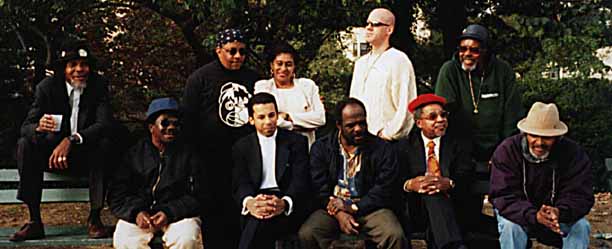
The first Ska sounds started to emerge in Jamaica around 1958. Coming form the American influence of Soul and R&B, and the Caribbean Mento style, a new musical genre was beginning to take shape in Kingston. The places it began to pop up were in churches, putting old Brittish hymns to a more syncopated Caribbean/soul rythms, and in the swing clubs of up-town Kingston. Prince Buster, who made the first Ska record, was playing some of these tunes and asked his guitarist, Jah Jerry, to emphasize the up-beat in the music and Ska was born. The Prince released original titles like "Ten Commandments Of Woman" and "Judge Dread" by 1960. Desmond Dekker was the next to release a hit record entitled "Honor Your Mother And Father." Mr. Dekker later became know as the king of Ska.  These early artists made record using studio musicians, and there was no steady Ska band, at least not until The Skatellites (pictured above). The Skatellites were basically the studio musicians who had been called in to do the backing music for artists like Desmond Dekker, and Prince Buster. These new bands in Jamaica sang mainly of the plight of the poor in jamaica. The Island was at the time a Brittish colony and many poor blacks were forced into shanty towns outside the ritzier areas of town, much like South Africa. These people were not content to be silently pushed to the side and fought back. They were given the name "Rude Boy," meaning a poor man creating disturbances in the street. Many old songs tell of the Rude boy's riots for the right to live and work in the city. In 1964 the Summer heat became so unbearable that people stopped dancing. The bands quickly realized this and began to slow the music down. This led to the advent of the Rocksteady and Reggae styles. Ska began to die in the late sixties because of the popularity that Reggae had begun to enjoy. This was the end of the First Wave Of Ska.
These early artists made record using studio musicians, and there was no steady Ska band, at least not until The Skatellites (pictured above). The Skatellites were basically the studio musicians who had been called in to do the backing music for artists like Desmond Dekker, and Prince Buster. These new bands in Jamaica sang mainly of the plight of the poor in jamaica. The Island was at the time a Brittish colony and many poor blacks were forced into shanty towns outside the ritzier areas of town, much like South Africa. These people were not content to be silently pushed to the side and fought back. They were given the name "Rude Boy," meaning a poor man creating disturbances in the street. Many old songs tell of the Rude boy's riots for the right to live and work in the city. In 1964 the Summer heat became so unbearable that people stopped dancing. The bands quickly realized this and began to slow the music down. This led to the advent of the Rocksteady and Reggae styles. Ska began to die in the late sixties because of the popularity that Reggae had begun to enjoy. This was the end of the First Wave Of Ska.

Many people began to migrate from Jamaica to Brittain in the late sixties into the seventies, bringing their music and culture with them. It was picked up by many of the young, white, poor kids that the Jamaicans moved in next door to. The Specials formed as one of the first 2-Tone Ska bands in 1978, and started 2-Tone records. Many of the bands associated with the Second Wave were on 2-Tone, such as: The Beat, Madness, The Body Snatchers, and The Selecter. Meanwhile, on the other side of Coventry, Buster Bloodvessel And His Bad Manners were rocking the clubs with the new hit Ska sound. 2-Tone enjoyed initial popularity, but it died quickly. And when 2-Tone records went under, it took most of its bands with it. This was around 1981-82. The Specials reformed later in the eighties, but with a different line-up. the only Second Wave band untouched by the 2-Tone turmoil was Bad Manners, who purposely excluded themselves from the second Wave 'in-crowd.' They are still playing today, unchanged for 20 years. That was the end of the short lived, but musically rich, Second Wave Of Ska.
In 1985 a band called "Not Bob Marley" in New York released "Thrill me up." About a month later they changed their name to The Toasters and have been known as such since they began the Third Wave of Ska. This period is what most people today associate with when they hear the word "Ska." Bands like the Allstonians, Skavoovie and The Epitones, and The Blue Beats have kept a traditioanal feel to the music while bands like Operation Ivy and The Mighty Mighty Bosstones have begatten ska-core. Most people today only know Ska of the ska-core brand because of its sudden popular thrust. But, bands like Less Than Jake, Against All Authority, Skankin' Pickle, and MU330 are not real Ska by any strech of the imagination. And No Doubt doesn't even get on the not-quite-Ska list, they just suck, and they polute the name of Ska. The Third Wave has not yet died, and hopefully it wont. The Skatellites are still touring and relesing records, as well as Bad Manners and The Specials who continue to produce hit records. It is not a musical trend it is a genre, and a genre doesn't die.
